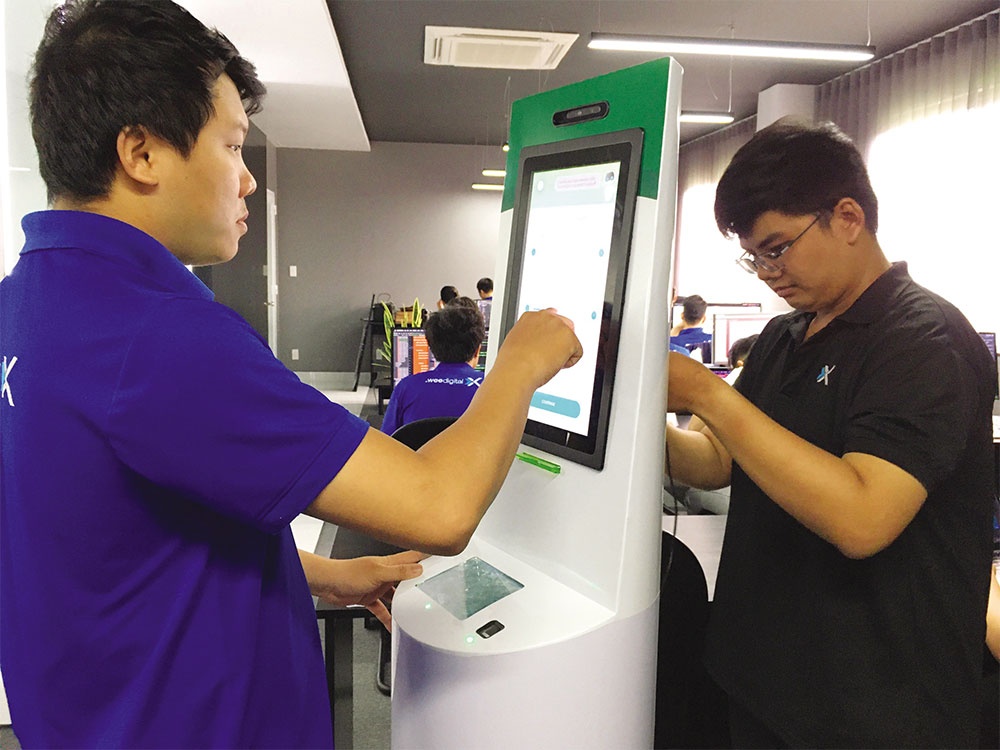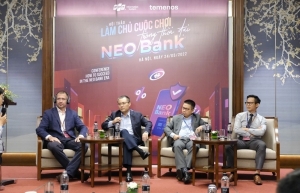Fintech future in store for smarter M&A deals
Japanese multinational air conditioning manufacturing company Daikin Industries last week unveiled its plan to spend over $710 million, including in funding and merger and acquisition (M&A) plans over the next four years in Southeast Asia and India to produce core components and smaller air conditioners.
The Osaka-headquartered firm’s proposed deals and other investment schemes through to fiscal year 2025 are set to represent a 60 per cent increase over the previous 4-year period’s expenditures. Yoshihiro Mineno, senior executive officer of Daikin Industries, said the firm’s funds for further investment and M&A will be poured into improving already existent infrastructure in Vietnam.
 |
| Although much of the population uses e-payments, there is much scope for an M&A boom in related fintech deals, photo Le Toan |
According to KPMG Vietnam, M&A activities in Vietnam slowed in 2022, and the average deal size for a transaction with disclosed value has declined from $31.1 million in 2020 to $16.5 million in the first 10 months of 2022.
The first 10 months of this year brought in a total of $5.7 billion, down 47.4 per cent from the whole year of 2021 and down 12 per cent from 2020. Only 13 mega transactions exceeding $100 million were registered in the first 10 months of 2022, down from 22 in the same time the previous year.
Nevertheless, Herston Elton Powers, managing partner of 1982 Ventures, told VIR that the macro and demographic drivers of Vietnam would continue to drive growth in Vietnamese tech, specifically fintech and venture capital (VC) ecosystems.
“The next wave of Vietnamese fintech founders will begin launching new and sophisticated business models, such as open banking platforms and business-to-business solutions, thus bringing about more prospective deals in the fintech industry,” said Powers.
Rising market
Also last week, Japanese megabank Sumitomo Mitsui Banking Corporation (SMBC) inked a deal with Vietnamese fintech firm SmartNet to buy $9.2 million shares. With this deal, SMBC plans to accelerate its Asia franchise expansion and bolster its regional digital banking capabilities.
Founded in 2015, SmartNet delivers payment solutions in Vietnam focusing on micro, small and medium-sized enterprises (MSMEs). The company owns and operates e-wallet SmartPay.
SmartNet chairman Marek Forysiak said, “We provide financial solutions to MSMEs to help them address operation issues and develop their businesses. Besides payment solutions, we offer different services like buy now, pay later (BNPL), flexible consumer credit, or instalments via card, which are only available from big retail chains. The agreement with SMBC is an important step for us to become the leading service supply platform for merchants.”
In 2021, SMBC successfully acquired a 49 per cent stake in Vietnam’s largest consumer finance company, FE Credit, in a $1.4 billion deal – the largest financial M&A deal in Vietnam. SMBC is also rumoured as a potential strategic foreign investor of VPBank, the parent company of FE Credit.
Also last week, fintech startup Rootopia announced it had wrapped up a $1 million investment in a pre-seed round from Genesia Ventures, ThinkZone Venture, and BK Fund. Rootopia is a fintech platform that helps students continue their education by taking care of their tuition and fee needs. With the fresh fund, Rootopia intends to keep experimenting and expanding its pool of early user base to achieve the right product-market fit.
Fundiin, a BNPL fintech company in Vietnam, meanwhile successfully bagged $5 million in a Series A funding round co-led by Trihill Capital and ThinkZone Ventures. This followed existing investors including 1982 Ventures, Genesia Ventures, JAFCO Asia, Zone Startups Ventures, and Do Thu Ngan, former deputy CEO of Sacombank.
Nguyen Anh Cuong, co-founder of Fundiin, said, “While credit card penetration rates in developed countries range from 50 per cent to more than 70 per cent, in Vietnam, this rate is only 5 per cent. This shows that Vietnam is a high potential market for BNPL to develop and is also an important solution to promote financial inclusion and prevent loan sharks, one of the most important missions in the national financial inclusion strategy.”
Some foreign fintechs, particularly payment businesses, are tapping into Vietnam’s lucrative market.
In mid-November, Google Wallet increased its footprint to Vietnam, Thailand, and Malaysia. This feature is available only to Visa cardholders in Vietnam, with Mastercard to be included in the coming weeks. Several banks offer this function, but not all enable it for both credit and debit cards.
Poor regulatory framework
In addition, Vietnamese customers are becoming more accustomed to embedded financial services, encouraging more non-financial businesses to include payment and loan options within their apps.
A fresh study from UOB, PwC Singapore, and the Singapore Fintech Association showed that the awareness of embedded financial services in Vietnam is high, with around 90 per cent reporting they were aware of apps with built-in financial services.
Some embedded finance companies in Vietnam, such as Credify, are also gaining traction and increasing user engagement through enhanced utility.
According to Huy Pham, founder of the FinTech-Crypto Hub at RMIT University, Vietnam ranks third among ASEAN in terms of digital payment users, with approximately 59 per cent of the Vietnam population exposed to digital payment, behind Singapore and Indonesia. However, the total transaction value of this sector in Vietnam is only higher than that of Malaysia and falls far behind the Philippines and Thailand.
In addition, although almost 60 per cent of the Vietnamese population has some exposure to digital payment, the transaction value of this sector is relatively low, leading to a low average transaction value per user. A relatively similar trend is observed in other segments, such as digital assets, digital investments, neo-banking, and alternative financing.
A survey by GlobalData revealed that the card payments industry in Vietnam is projected to increase by 23.8 per cent, reaching around $37.6 billion in 2022, led by the digital payment expansion.
Moreover, Vietnam is leading crypto adoption worldwide, and the Vietnam blockchain industry is drawing much attention from foreign investors. However, the crypto/blockchain market faces several obstacles, such as scams with no investor protection, leading to a decrease in investor confidence.
“The current environment may discourage firms in this industry from establishing their headquarters in Vietnam and setting up their bases in countries that provide more incentives, such as Singapore or the United Arab Emirates. The Vietnamese government is also missing out on an enormous amount of tax collection from cryptocurrency trading activities,” Pham said.
He added that despite an active fintech market, there is still a lack of a proper regulatory framework, and several actions are required to further boost the market’s growth.
“An initiative in 2017 to develop a fintech regulatory framework and sandbox has not materialised. If Vietnam does not have a sandbox soon (mid-2023 at the latest), we might lose the opportunity to become a leading fintech-blockchain hub given stiff competition from other countries,” Pham said.
Secondly, the government needs to ensure Vietnam has proper ICT infrastructure. “Tech and financial education will play a key role in increasing citizens’ awareness and helping them avoid scams or threats in the fintech-blockchain space,” Pham added.
 | Digital strategy for banks to lead the game in neobank era The development of fintech companies and the emergence of neobanks have been creating a fierce race in the banking and finance industry. FPT IS and Temenos have recently discussed optimal approaches with the banking industry's leaders about how to lead the race. |
 | Making an impact in fintech sector requires knowledge, says leading FCPA The fintech landscape is changing at lightning speed, with transformations impacting everything related to payments, money, and banking, according to Ashish Verma FCPA (Aust.), head of finance, IT, and commodities for the global market player Kirby South East Asia. |
 | Digesting fintech sandbox draft rules A couple of months ago, the Vietnamese government issued a second draft decree on implementation of the regulatory sandbox for fintech. |
 | Unbinding legal bottlenecks to spur fintech development Despite the hot-paced development experienced in Vietnam’s fintech industry, the bottlenecks in the regulatory system have yet to be fully addressed in the face of current financial constraints. |
What the stars mean:
★ Poor ★ ★ Promising ★★★ Good ★★★★ Very good ★★★★★ Exceptional
Related Contents
Latest News
More News
- BJC to spend $723 million acquiring MM Mega Market Vietnam (January 22, 2026 | 20:29)
- NamiTech raises $4 million in funding (January 20, 2026 | 16:33)
- Livzon subsidiary seeks control of Imexpharm (January 17, 2026 | 15:54)
- Consumer deals drive Vietnam’s M&A rebound in December (January 16, 2026 | 16:08)
- Southeast Asia tech funding rebounds on late-stage deals (January 08, 2026 | 10:35)
- DKSH to acquire Vietnamese healthcare distributor Biomedic (December 24, 2025 | 15:46)
- Central Retail refocuses Vietnam strategy with Nguyen Kim exit (December 24, 2025 | 15:01)
- RongViet Securities wins sixth consecutive M&A advisory award (December 22, 2025 | 17:30)
- Kido Group divests from ice cream and frozen foods (December 18, 2025 | 16:49)
- Insurtech startup Saladin wraps up Series A funding round (December 17, 2025 | 09:10)

 Tag:
Tag:




















 Mobile Version
Mobile Version